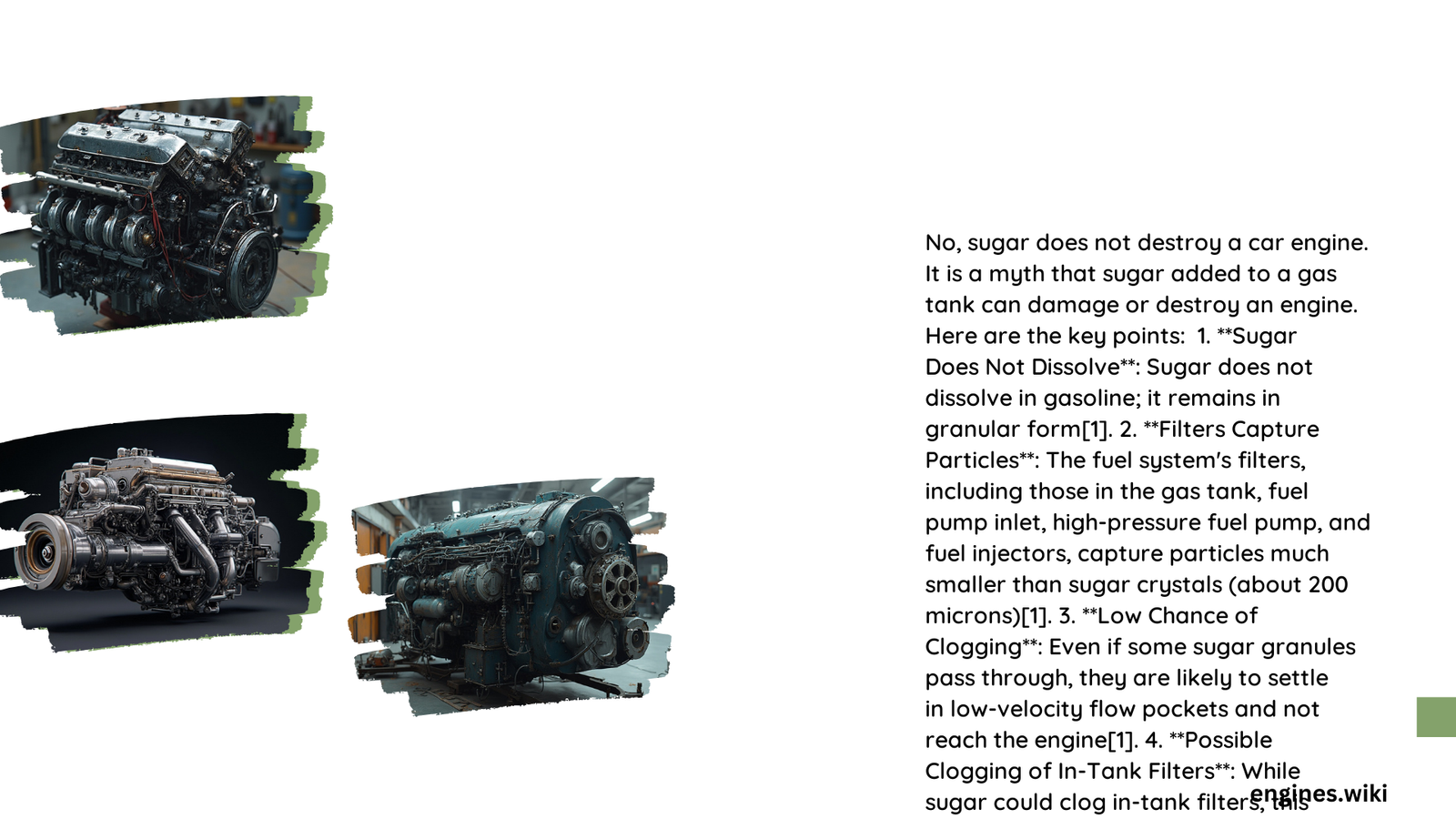Sugar in a car’s gas tank is often portrayed as a catastrophic act of sabotage, but the reality is less dramatic. While sugar doesn’t directly destroy a car engine, it can cause significant problems in the fuel system. The granular nature of sugar, its inability to dissolve in gasoline, and its potential to clog various components make it a serious concern for vehicle owners. This article explores the effects of sugar on car engines, debunking myths and providing factual insights into the potential damage and repair processes.
What Happens When Sugar Enters a Car’s Fuel System?
When sugar is introduced into a car’s fuel tank, it doesn’t dissolve in the gasoline. Instead, it remains in its granular form, creating a potential hazard for the vehicle’s fuel system. The sugar particles can:
- Settle at the bottom of the fuel tank
- Get sucked into the fuel lines
- Clog various filters in the fuel system
- Potentially reach and damage fuel injectors
The primary issue is not chemical damage but mechanical obstruction. Let’s delve deeper into the specific problems sugar can cause.
How Does Sugar Affect the Fuel System Components?

Fuel Filters
Sugar particles primarily impact the fuel filters, which are designed to catch contaminants before they reach the engine. There are several filters in a modern fuel system:
- Fabric filter surrounding the fuel pump pickup in the gas tank
- In-line fuel filter
- Filter on the high-pressure fuel pump
- Filters at the inlet of each fuel injector
These filters can become clogged with sugar granules, restricting fuel flow and potentially causing engine stalling.
Fuel Pump
The fuel pump can be indirectly affected by sugar contamination:
- Clogged filters increase the workload on the fuel pump
- Prolonged operation under these conditions can lead to fuel pump burnout
- Sugar granules settling in low-velocity pockets can obstruct the in-tank filters, further straining the pump
Fuel Injectors
While less common due to multiple filtration layers, sugar can potentially reach and clog fuel injectors if it manages to pass through the filters. This can lead to:
- Uneven fuel distribution
- Poor engine performance
- Potential engine misfires
Can Sugar Cause Chemical Damage to the Engine?
Contrary to popular belief, sugar does not cause significant chemical damage to the engine or fuel system components. The primary issues are mechanical in nature:
| Myth | Reality |
|---|---|
| Sugar dissolves in gasoline | Sugar remains in granular form in gasoline |
| Sugar causes corrosion | No significant chemical reaction occurs |
| Sugar turns into a syrupy substance | Sugar remains as solid particles in the fuel system |
The lack of chemical interaction means that the damage is limited to physical blockages rather than corrosion or degradation of components.
How Can Sugar Contamination Be Diagnosed?
Identifying sugar contamination in a fuel system involves several steps:
- Visual Inspection:
- Check the fuel tank for visible sugar granules
-
Inspect fuel lines and filters for signs of blockage
-
Fuel Flow Test:
- Perform a test to check fuel pump function
-
Assess for any blockages in the fuel lines
-
Tools Required:
- Fuel pressure gauge
- Wire or drill bit for clearing blockages
-
Replacement filters and fuel pumps (if necessary)
-
Diagnostic Process:
- Drain and inspect the fuel tank contents
- Check and potentially replace fuel filters
- Test fuel pump performance
- Inspect fuel injectors if other components are clear
The diagnosis and remediation process typically takes a few hours, depending on the extent of contamination and accessibility of components.
What Are the Repair Costs for Sugar Contamination?
The repair costs for sugar contamination in a car’s fuel system can vary but are generally not as severe as major engine damage. Typical expenses include:
- Replacing the fuel pump
- Changing all fuel filters
- Cleaning or replacing the fuel tank
- Potential fuel injector cleaning or replacement
On average, these repairs might cost a few hundred dollars, with more extensive damage potentially reaching into the low thousands.
Is There a Threshold Amount of Sugar That Causes Damage?
There’s no specific threshold amount of sugar that guarantees engine damage. The effects depend on various factors:
- Amount of sugar introduced
- Size of the fuel tank
- Type and efficiency of the vehicle’s filtration system
Even a small amount of sugar can cause issues, but it typically takes a significant quantity to create noticeable problems. It’s important to note that while sugar can cause fuel system issues, it’s unlikely to cause catastrophic engine failure on its own.
How Can Car Owners Prevent Sugar-Related Damage?
To protect your vehicle from sugar-related damage:
- Keep your gas cap locked when not in use
- Be cautious about where you park, especially in high-crime areas
- Regularly inspect your fuel system for any signs of tampering
- If you suspect contamination, have your vehicle inspected immediately
- Consider installing a locking gas cap for added security
By taking these precautions, car owners can significantly reduce the risk of sugar contamination and its associated problems.
In conclusion, while sugar doesn’t directly destroy a car engine, it can cause significant issues in the fuel system. Understanding the real effects of sugar contamination can help car owners take appropriate preventive measures and seek timely repairs if needed.
References:
1. Popular Mechanics: Can Sugar Destroy a Car’s Engine?
2. YouTube – MYTH BREAKERS: Sugar in Your Gas Engine Fuel Tank
3. JustAnswer: EFFECTS of SUGAR in GAS TANK: Q&A on REPAIR and DAMAGE
